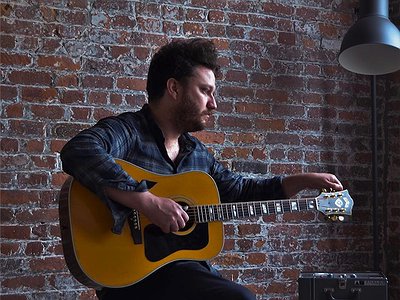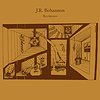Name: John Bohannon
Nationality: American
Occupation: Musician
Current Release: Recôncavo on Phantom Limb
Recommendation: The Storyteller’s Nashville by Tom T. Hall / Last Wave by Bernard Xolotl
Website/Contact: If you enjoyed this interview, keep up with J.R. Bohannon's activities and releases via his Facebook page.
When did you start writing/producing music - and what or who were your early passions and influences? What is it about music and/or sound that drew you to it?
I started writing music in my teens, a few years after I started learning guitar. I think once you develop an understanding of a language, you experiment with it - even in your earliest phases. This was the first time in my life that I had learned some sort of language and actually been conscious of the learning process, so that was pretty exciting.
For most artists, originality is first preceded by a phase of learning and, often, emulating others. How would you describe your own development as an artist and the transition towards your own voice? What is the relationship between copying, learning and your own creativity?
I think it comes with time and patience, letting things happen and breathe, but also having a certain discipline for what it takes to allow the music to flow through you completely. There are tools to be used that others created and what you do with them comes with your ability to express yourself as an individual. If you spend too much time thinking about a technique once you’ve learned it, you’re creating music simply with your mind and not your soul. I spend a lot of time learning technique, but once I’ve gotten to a certain point, I don’t have to think about it: I can seamlessly weave it into what I’m already doing it because it’s part of my playing at that point.
What were your main compositional- and production-challenges in the beginning and how have they changed over time?
My great friend and a huge inspiration of mine, Lisa Bella Donna, always says “I’m just trying to stay out of my own way.” I had never heard it put like that, and it really articulated something I had been feeling for a long time but couldn’t put my finger on. You have to let your creativity thrive, and you can’t get in its way compositionally or production wise. The moment you try and force something or overthink it, it gets in your way and the pure vision of your creation. It’s a constant struggle; you have to step aside and let yourself create without worrying about what others think, what kind of artist you need to sound like, or even if you’re mixing, trying to compare your mix to others. It’s great to do that for techniques, but in the end, when I’m mixing, I feel like I’m building a sculpture. It’s an interpretation, and it can be as abstract as I envision it.
What was your first studio like? How and for what reasons has your set-up evolved over the years and what are currently some of the most important pieces of gear for you?
My first and only studio lies inside of my bedroom. It may not be the best means of doing things, but in New York City, it’s one of the only ways. With that said, it’s a nice challenge, and it makes you think twice about decisions. Do I need this giant amp, or can I get away with a smaller one? Do I buy the full-sized keyboard, or get the module to save space, etc. The city I live in drastically changes the pieces of gear that I own. However, I love my Tascam 388, which I use extensively at home, even if not using the tape - the pres are fantastic. I love my Rains Carpsteel Pedal Steel, which is one of the lightest steels ever made, allowing me to take gigs I wouldn’t take otherwise. My Guild D-55 I bought from Glenn Jones a handful of years ago will always be a staple at home, as I think it’s the first guitar I sat down with and said, ok, this is going to be my life’s work, whether it pays the bills or not.
How do you make use of technology? In terms of the feedback mechanism between technology and creativity, what do humans excel at, what do machines excel at?
I use technology to create every day. But I don’t consider technology to be just our computers, smart phones, etc. I look at my pedal steel guitar and think of it as one of the greatest pieces of technology ever assembled. The builds on my guitars were intersected with whatever technology was available at that time. I find inspiration in the many generations of human created machines, and I will continue to utilize both elements of past and future technology.
Production tools, from instruments to complex software environments, contribute to the compositional process. How does this manifest itself in your work? Can you describe the co-authorship between yourself and your tools?
With the music I compose under my own name (not the ambient works I’ve done in the past), modern technology plays really no part in it. I wanted to get away from the distractions and spend time with an actual instrument and find the intricacies in each instrument I own. I could never record with just one guitar for example, because I think each guitar allows itself to just as many explorations as the musical content that comes from it - the feeling, the sound, the vibration against your belly while you play it - it all changes along with way you respond to it.
Collaborations can take on many forms. What role do they play in your approach and what are your preferred ways of engaging with other creatives through, for example, file sharing, jamming or just talking about ideas?
Collaboration is life. I collaborate with people every day in many forms, so it’s essential. Musically, it gives me new lifeblood and ideas, because everyone has their own way of speaking musically - and it’s not always the way we were taught. I’ve always been keen to explore with the non-traditionalists, or the people that took the tradition and turned it upside down. I have a couple collaborative LPs in the works: one with David Charles Shuford (D Charles Speer, No Neck Blues Band) and one with Alexander Turnquist. Both involve completely different ideas/visions. I also have a split coming out later this year with Lee Noble, and I love the idea of collaboration via a split, as you both try and complete a vision together.



